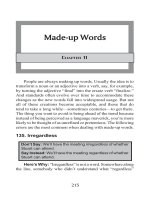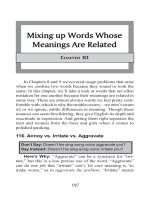Mixing up Words That Look the Same
Bạn đang xem bản rút gọn của tài liệu. Xem và tải ngay bản đầy đủ của tài liệu tại đây (341.5 KB, 16 trang )
181
Mixing up Words That Look the Same
C
HAPTER
9
Mixing up Words
That Look the Same
181
In Chapter 8 we examined words that sound the same; in
this unit, we’ll learn to tell apart words that look the same—
like members of the same family that all have the same pecu-
liar nose. Some of these words are pretty common. Others are
words we read more often than we hear, so when it comes
time to use one, we often confuse it with one of its close cous-
ins. But even though the words look alike, they can’t do the
same things in our sentences: just like two twins won’t do the
same things if one happens to be a plumber and the other hap-
pens to be a ballet dancer.
97. Adapt vs. Adopt
Don’t Say: After one week with the kids, Quentin was
already adopting to their behavior.
Say Instead: After one week with the kids, Quentin was
already adapting to their behavior.
Here’s Why
:
“To adapt” means to adjust to something or
to make something suitable. “To adopt” means to accept or to
r Bad Grammar Ch 09.pmd 3/17/2004, 9:46 AM181
182
When Bad Grammar Happens to Good People
take as one’s own. In this sentence, we’re talking about Quentin
adjusting to the behavior of the children, not taking their be-
havior as his own—another possibility, and a humorous one,
but not the intended meaning here. A few additional correct
examples are:
Melinda adapted quickly to her new job.
The UN will
adopt that resolution.
We’ll
adapt the building to make it wheelchair
accessible.
98. Allusion vs. Illusion vs. Delusion
Don’t Say: He made illusions to his book in every speech.
Say Instead: He made allusions to his book in every
speech.
Here’s Why:
With these three words, one little syllable
makes all the difference. “Illusions” are false impressions. “De-
lusions” are closely related—they are also false impressions—
but “delusion” also conveys a sense of being acted upon, as
when a person’s delusions of grandeur make her give up her
day job. “Allusions” are completely different. They are indirect
references to something, which is what’s happening in the ex-
ample sentence—the speaker makes indirect references to his
book. So “allusions” is the right choice. Here’s another correct
example of each:
The bridge looked as if it were swaying, but that was
just an illusion right?
Perry had harbored so many
delusions about being
promoted that he refused to believe he was fired.
The Nine Lives Society loved the
allusions to
reincarnation in your poem.
r Bad Grammar Ch 09.pmd 3/17/2004, 9:46 AM182
183
Mixing up Words That Look the Same
99. Assignment vs. Assignation
Don’t Say: Lee’s assignation was to finish the analysis
by March.
Say Instead: Lee’s assignment was to finish the analysis
by March.
Here’s Why:
Boy, you don’t want to confuse these two
nouns. “Assignation” means the act of making an assignment.
But is also means a tryst or an arranged meeting, usually be-
tween two lovers. “Assignment” refers to the task itself that
someone has given you to do. Now it’s possible to have an
assignation as your assignment if you are, say, a spy or some-
thing. But even then, the words aren’t interchangeable. So here,
where we’re talking about a regular old project that Lee has
been given to do, “assignment” is what we want. Additional
correct examples are:
Your assignment is on the microfilm in your shoe.
Their
assignations were brief and secret.
The
assignation of Trevor to that post was shocking.
(We’re talking about the action that someone had taken
in assigning Trevor, not the assignment itself.)
Give me a more original excuse than “the dog ate my
assignment.”
100. Childlike vs. Childish
Don’t Say: Dr. Levin still has the same childish wonder
about science that he had as a boy.
Say Instead: Dr. Levin still has the same childlike wonder
about science that he had as a boy.
Here’s Why:
“Childish” and “childlike” both describe the
qualities of children, but they have very different meanings.
“Childish” is a negative reference to children’s lack of matu-
rity, their silliness. “Childlike” is a positive reference to the
r Bad Grammar Ch 09.pmd 3/17/2004, 9:46 AM183
184
When Bad Grammar Happens to Good People
innocence and unselfconsciousness of children. So in this sen-
tence, where the intent is clearly to describe the doctor in posi-
tive terms, “childlike” is the appropriate choice. Additional
correct examples are:
Dana’s childish behavior during poker games led to
the breakup of the group.
She has a
childlike optimism about the future.
He threw a
childish tantrum when his dog took third
place at the show.
Mike bounced back from his trauma with a
childlike
resiliency.
101. Continual vs. Continuous
Don’t Say: Tilly’s phone rang continuously until her father
disconnected it.
Say Instead: Tilly’s phone rang continually until her father
disconnected it.
Here’s Why:
There’s a very subtle shade of difference
here. “Continuously” refers to something that goes on without
any interruption whatsoever. “Continually” refers to something
that recurs at frequent intervals. In this case, the meaning is
that many calls came in—at intervals that were too short for
her father’s liking. So “continually” is correct. Other correct
examples are:
Dave ran continuously for six hours, then collapsed.
She claimed she made
continual efforts to reach him.
Gina’s string of handball victories was
continuous.
For weeks, Don proposed to her
continually until
Shirley agreed to marry him.
r Bad Grammar Ch 09.pmd 3/17/2004, 9:46 AM184
185
Mixing up Words That Look the Same
102. Creditable vs. Credible vs. Credulous
Don’t Say: We were surprised by the actor’s credulous
portrayal of a woman.
Say Instead: We were surprised by the actor’s credible
portrayal of a woman.
Here’s Why:
“Credulous” means to be gullible, ready to
believe just about anything, as in a credulous child. “Cred-
ible” means to be worthy of belief, as in a credible story. And
“creditable” means to be worthy of receiving credit or praise,
as in a creditable effort on a job. In this case, where the
meaning is that a man is playing a woman’s part, the issue is
one of believability, and so “credible” is the most appropriate
choice. We could also have given the sentence a slightly differ-
ent sense by saying that his performance was “creditable,” mean-
ing that it was worthy of praise. But “credulous,” meaning gullible,
just doesn’t work. Here’s another correct use of each:
He was too credulous to be trusted with the
negotiations.
She did a
creditable job on that assignment.
Sharon is the most
credible speaker on the circuit.
103. Incredible vs. Incredulous
Don’t Say: That excuse is simply incredulous.
Say Instead: That excuse is simply incredible.
Here’s Why:
These two words are the opposite numbers
of “credible” and “credulous.” “Incredible” means not cred-
ible or not believable, without credibility. It is often applied in
a positive sense to things that are so good they’re almost
unbelievable—his luck is incredible—but the true sense of
the word is “not believable.” “Incredulous,” on the other hand,
means skeptical, unwilling to believe—the opposite of credu-
lous, which means that someone is too ready to believe. In this
r Bad Grammar Ch 09.pmd 3/17/2004, 9:46 AM185
186
When Bad Grammar Happens to Good People
sentence, we’re not talking about a person’s being skeptical,
we’re talking about an excuse being unbelievable, so “in-
credible” is correct. Other correct examples are:
Julia’s expression was incredulous during the speech
on aliens from outer space.
I can see you are
incredulous, but my story is true.
Sir, your accounts of your whereabouts on the evening
of the ninth are
incredible.
Phil’s demonstrated
incredible skill on the trampoline.
104. Elegy vs. Eulogy
Don’t Say: The song was a eulogy mourning the death of
his father.
Say Instead: The song was an elegy mourning the death
of his father.
Here’s Why:
An “elegy” is a song or poem that mourns
one who has died. A “eulogy” is a formal statement or speech
expressing praise. Eulogies, of course, are often given at fu-
nerals, where the idea is to remember and praise the person
who has died. But the word also applies to happier circum-
stances. One might, for instance, give a eulogy for an honored
guest at a dinner. Here are additional correct examples:
The poet’s musings on death resulted in his famous
elegy for his father.
Dana didn’t feel she had known Jim well enough to
give the
eulogy at the service.
The president delivered a
eulogy to the heroes who
came to the capitol.
105. Epitaph vs. Epithet
Don’t Say: What was the epithet on her tombstone?
Say Instead: What was the epitaph on her tombstone?
r Bad Grammar Ch 09.pmd 3/17/2004, 9:46 AM186









